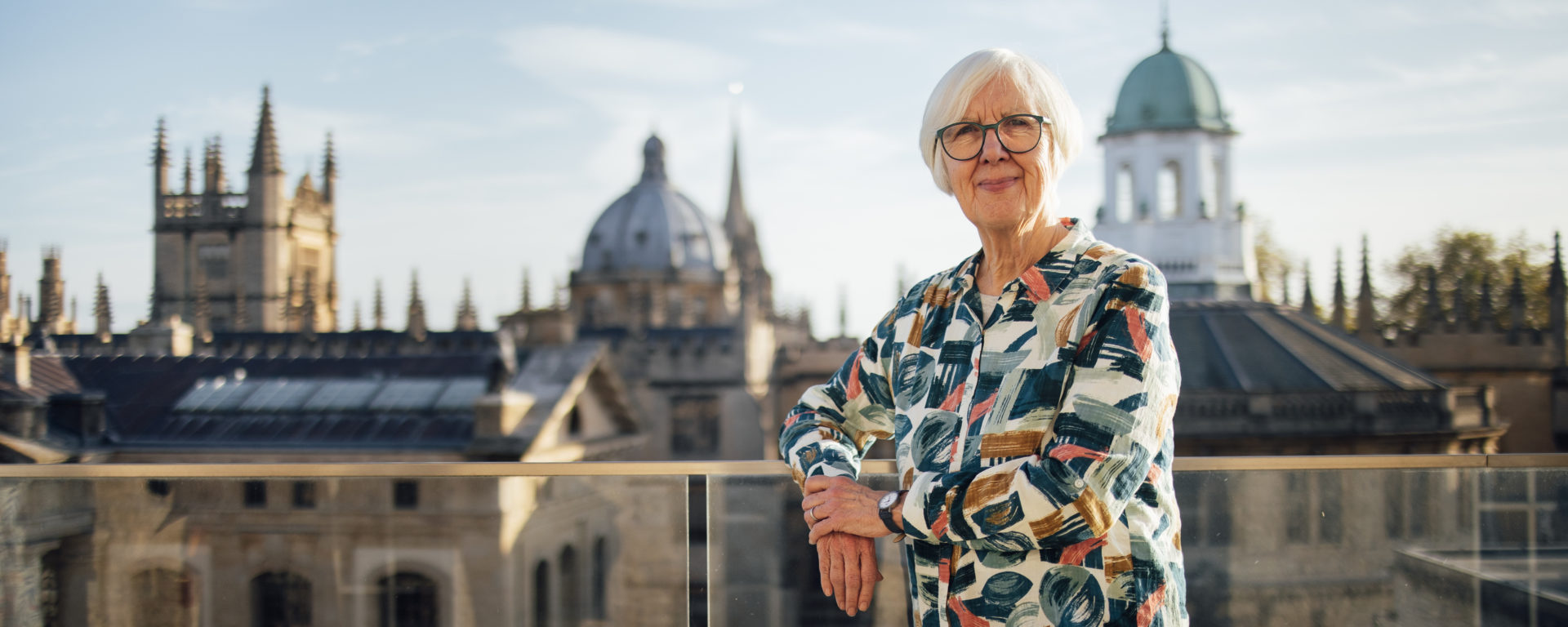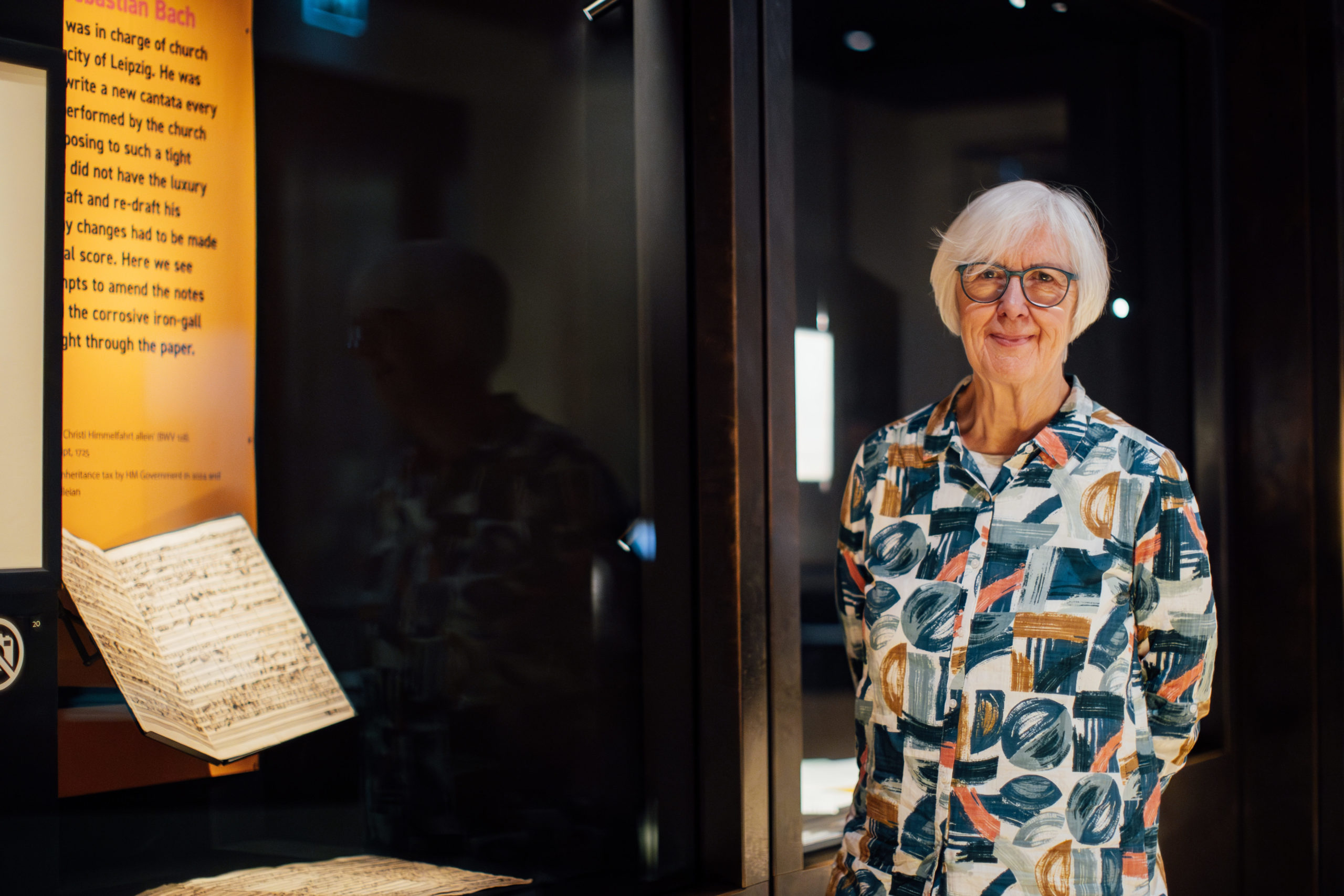
In Conversation: Dame Judith Weir and Professor Martyn Harry

Ahead of Bach 1725, Professor Martyn Harry spoke with renowned composer Judith Weir, whose new composition will premiere at the celebration concert on Wednesday 7 May. Commissioned by the Bodleian Libraries, Weir’s piece offers a contemporary reflection on Bach’s Ascension Day Cantata (BWV 128). Known for her innovative approach to storytelling through music, Weir shares the inspiration behind this new work, her experience of engaging with Bach’s music, and what she hopes audiences will experience during this special celebration.
Martyn Harry: Can you please tell us about your new work Upwards and how it relates to the Bach manuscript celebrated in tonight’s concert?
Judith Weir: I approached Upwards as an overture to the Bach cantata we are talking about – Auf Christi Himmelfahrt allein. It uses the same instruments as the whole cantata, including two horns and trumpet. Although I think it’s the case that in Bach’s day the trumpet player would have been one of the horn players, I took the opportunity to have the whole lot of them. I wanted it to be very closely related to the first movement of the cantata, because after all my piece will be immediately preceding that first movement. In other words, I was ignoring the rest of the cantata and just looking at that huge opening movement, which is a chorale-prelude, with a chorale sung by the trebles, very slowly over the top of the music.
I looked at the Bach both in the manuscript and the printed version, and started off by looking at actual figures that Bach uses to accompany his chorale. From there, I started to add my own notes and rhythmic figures. The thing that is so obvious in the whole cantata (about Ascension Day) is that the chorale melody in this movement is very flat in terms of contour whereas everybody else is playing leaping upwards figures all the time. So that really became my concept for the piece: the individual things that people play should always tend to be upwards scales or melodies in some way. And generally speaking, the music moves upwards through the piece and ends as an almost pictorial attempt at going up into the sky.

MH: This commission presents an exciting challenge in writing for the instruments and players of the Orchestra of the Age of Enlightenment. What is your approach for composing for early music instruments?
JW: I think particularly with instruments that we don’t really have now, like the oboe d’amore and the oboe da caccia, just to try and find out about them. To imagine as closely as possible the experience of the performers as they play these instruments. Speaking about those woodwind instruments, they don’t have so many helpful keys as modern instruments, so you have to think about the shape of your melodies: will this work for them? And of course, looking at these incredibly high brass parts in both the horns and the trumpets that we’re not used to in modern orchestral music. It would be a big ask to have, for instance, the horns playing quite so high all the time, but it certainly seems to work in the Bach.
So, I think my approach there is just to try and understand how those instruments are played and how can they do that. And of course it is terribly important to try and work out what the instruments can’t do, so for instance, these natural horns, they don’t have any extra valves, so you have to imagine them just playing a metal tube that can just play the harmonic series, plus maybe a little bit where the embouchure, the lip position, might help you to play something a little flatter or something like that. But on the whole, I try not to think of it as a restriction, it’s a chance to hear very different tones in the music I am going to write.
MH: When I first met you, you played the oboe. Have you found yourself re-engaging with your own playing experience of the oboe, given that there are three different types of oboe available in this piece?
JW: Well, I was lucky as a student that someone lent me a baroque oboe (it might have been a reconstruction). I didn’t make much of it! It was terrifically hard to think about how to create a reed and get it to do anything. So, I massively admire all the people in the last fifty years who have done that to such a high standard.
My memories of playing Bach as an oboe player are about the breath, the enormous solos that you play, particularly in the solo arias – we’ve got one actually in this piece – and just how strong and how careful you have to be about finding places to breathe. I do marvel at the fact that Bach’s work is just full of these. They are gorgeous tunes; they’re probably the best ever. But oboe music, it’s extremely difficult to play. And I guess, seeing these historical instruments, at least the physical strain isn’t so great, but I would think the finger problems must be pretty considerable!
Professor Martyn Harry is Professor of Composition at the Music Faculty, University of Oxford as well as a Fellow and Tutor at St Anne’s College and Lecturer at St Hilda’s College.
If you’d like to be there for the premiere of Judith Weir’s new work Upwards as part of a Bach celebratory concert, tickets are still available for Bach 1725 taking place on Wednesday 7 May. Presented by the Cultural Programme at Oxford University and the Bodleian Libraries.
